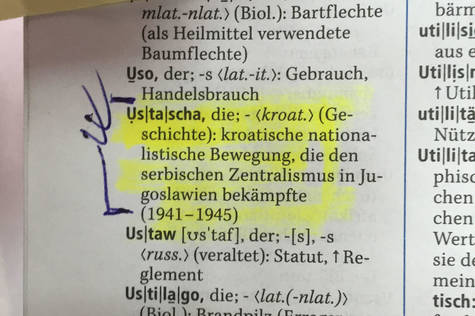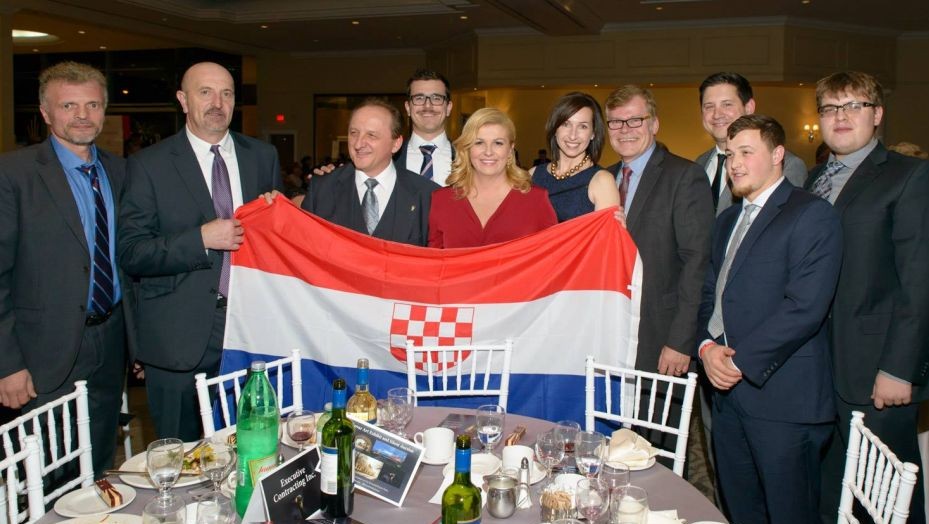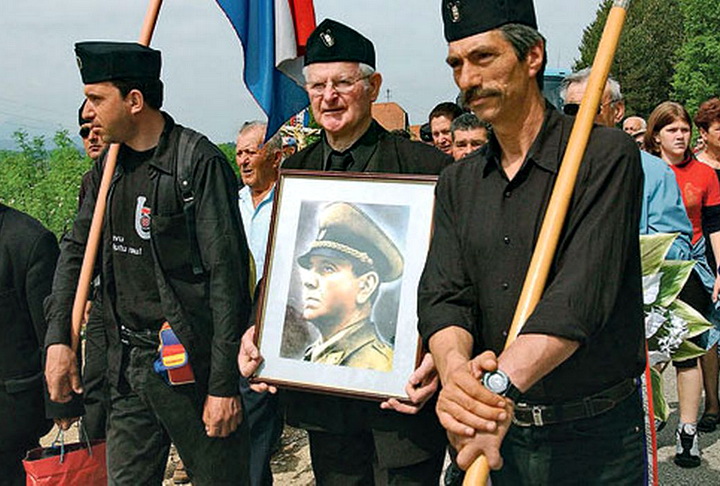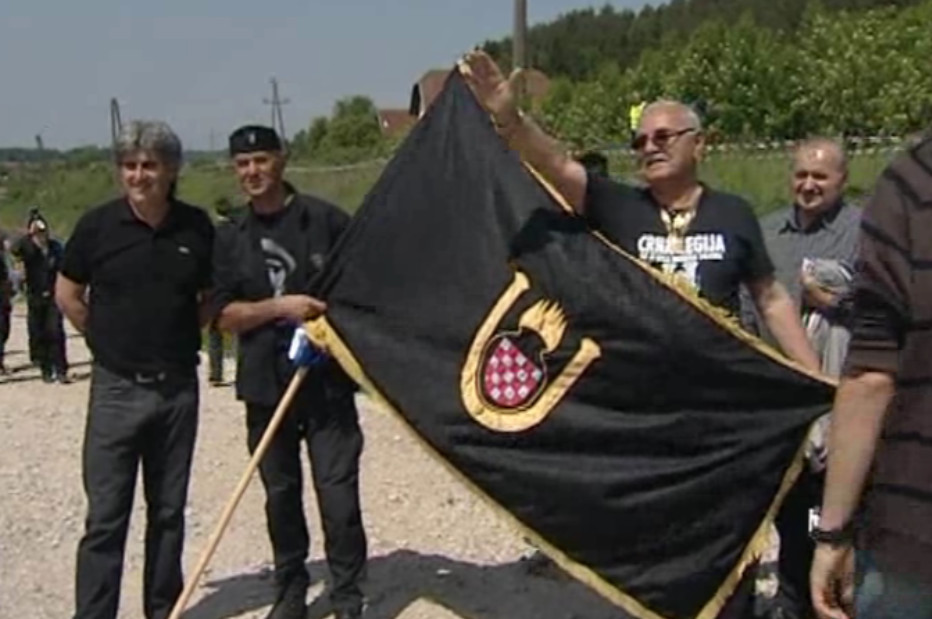
Views: 3367

Over the past several years, analysts and commentators have noticed a rising tide of domestic support for the Croatian homegrown Nazi movement of the Second World War, the Ustashe, which actively exterminated Serbs, Jews, and Roma in the territory it controlled from 1941-45. Far from condemning this alarming development, the Croatian government, the European Union, and non-state actors within it have tacitly and actively supported the rising tide of sympathy towards the Ustashe.
This disconnect between the ostensible “European values” of human rights and tolerance that the European Union claims to represent, and its tacit support of trends towards extremist politics in Croatia will have a significant impact on the increasing trend of Euroscepticism in Serbia and other Balkan states. Furthermore, the Union’s unabashed condemnation of legitimate populist movements in Europe, including but not limited to the Brexit campaign, as “racist” and “xenophobic,” while quietly supporting genuinely extremist political elements will contribute to the increasingly popular perception of the EU as a hypocritical entity.
Surge in Ustasha Sympathy
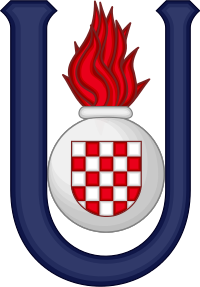 The Republic of Croatia has, since its independence, often reverted to the imagery of its Second World War predecessor; the Independent State of Croatia (NDH). The NDH was a puppet state sponsored by Nazi Germany and Fascist Italy, and was administered by the Ustashe.
The Republic of Croatia has, since its independence, often reverted to the imagery of its Second World War predecessor; the Independent State of Croatia (NDH). The NDH was a puppet state sponsored by Nazi Germany and Fascist Italy, and was administered by the Ustashe.
During its brief four-year lifespan, the NDH made use of a form of clerical fascism built on the basis of discrimination and systematized liquidation of non-Croatian elements within its boundaries. It was responsible for the deaths of anywhere between 300,000 to 600,000 Serbs and tens of thousands of Jews and Roma.
While restricted by law, Ustashe symbolism is freely exhibited at sporting events, political rallies, and all manners of public gatherings. The penalties for these displays are often restricted to a small monetary fine. By comparison, German law (Strafgesetzbuch section 86a) stipulates that a fine and/or a sentence of up to three years imprisonment will be administered.
Ustasha support among football hooligans (including a recent event during Euro 2016 where Croatian fans openly brandished swastikas) has been popular for decades; a more alarming trend is the active and tacit support of the Ustashe movement and legacy coming from the Croatian government. Earlier this year, the government of Croatia was condemned for appointing Zlatko Hasanbegovic, a prominent and open admirer of the Ustashe regime to be the country’s minister of culture. Croatia’s president, Kolinda Grabar-Kitarovic, is an avid fan of the pro-Ustashe musician Marko Perkovic “Thompson” and, while describing the Ustashe regime as “criminal”, also stated in the past that the NDH “at least protect[ed] the interests of the Croatian people” during its short and incredibly violent reign.
Silence at Best, Encouragement at Worst
Despite ongoing reports by international NGO’s of state-sponsored discrimination against Croatian Serbs and routine desecrations of Serbian churches and cultural monuments at the hands of pro-Ustashe elements in the country, the European Union has remained almost completely silent on the issue of growing pro-Ustashe sympathies in the Croatian government and political scene.
Rather than condemn the rising tide of Ustashe sympathy in the country or denounce the appointment of Ustashe sympathizers to some of the Croatian government’s highest ministries, the European Union has chosen to tacitly support the creeping return of political extremism to Croatia. On June 15th, an exhibition dedicated to Cardinal Alojzije Stepinac was held at the European Parliament, one of the EU’s most important institutions of governance. Cardinal Stepinac, who served as the Croatian Catholic Archbishop of Zagreb from 1937 to 1960, was an active supporter of the Ustashe regime and according to prominent Balkan historian Bernd Jurgen Fischer “had close association with the Ustashe leaders as the archbishop of the capital city, had issued proclamations celebrating independent Croatia, and welcomed the Ustashe leaders.”
The European Union has yet to respond to any of the criticisms lodged against it for hosting an event dedicated to a key supporter of a Nazi-backed regime that murdered hundreds of thousands of innocent civilians during the Second World War.
A recent definition (pictured below) of the Ustashe regime in the leading German language dictionary ‘Duden’ as a “movement which fought against ‘Serbian centralism’” has also provoked a firestorm of controversy and a rapidly growing online petition sponsored by the humanitarian organization 28 Jun. (full disclosure: we are both members of this organization). The definition makes no reference to any of the Ustashe’s well-documented and numerous crimes against civilian populations, giving it the appearance of a legitimate political movement with reasonable aims. These recent events are contributing to the growing sentiment among many Serbs who feel alienated by the European Union, and as if a double standard is being applied with regards to Serbia.
Loss of Credibility
Since Serbia attained candidate status in 2011, the European Union has imposed on it a host of requirements and stipulations that ostensibly deal with human rights and unresolved issues stemming from the Yugoslav Conflicts of the 1990’s. The Serbian government has largely complied with the conditions imposed on it by the European Union and has committed itself to the EU through acts such as extraditing members of its own government and “normalizing” relations with the Republic of Kosovo (a self-declared state which unilaterally declared independence from Serbia in 2008) at the behest of the European Union. Additionally, many EU states voted in favour of a failed UN resolution that sought to classify the controversial events in Srebrenica in 1995 as “genocide”.
Given the fact that the European Union has both passively supported the rise tide of extremist political inclinations in one of its member states by refusing to condemn it and actively supported it by hosting exhibitions in its honor, Serbs’ enthusiasm for joining the EU will likely continue to wane. The European Union has demonstrated a lack of integrity and even-handedness in upholding its stated human rights values by enforcing relatively harsh standards for Serbia while imposing virtually none on Croatia, even going as far as openly supporting some of Croatia’s worst historical human rights abusers. Coupled with growing Eurosceptic sentiments in both Serbia and Europe as a whole, the European Union’s quiet support of radicalized politics in Croatia could jeopardize the EU’s strategic goals of acquiring Serbia as a member.
 Furthermore, the double standard shown by the European Union in its dealings with Croatia and Serbia represent yet another example of the moral hypocrisy of the European Union. While top EU officials were quick to denounce legitimate populist movements such as the Brexit campaign as racist and xenophobic, those same officials and institutions have done nothing but tacitly support genuinely extremist politics in Croatia. Eurosceptic parties such as Front Nationale and the Austrian Freedom Party are routinely branded as “far right” and “radical” while political extremism in Croatia is allowed to flourish. If the European Union does not take steps to meaningfully combat this moral hypocrisy, then it is likely that the trend of increasing skepticism towards the Union will continue to rise unabated.
Furthermore, the double standard shown by the European Union in its dealings with Croatia and Serbia represent yet another example of the moral hypocrisy of the European Union. While top EU officials were quick to denounce legitimate populist movements such as the Brexit campaign as racist and xenophobic, those same officials and institutions have done nothing but tacitly support genuinely extremist politics in Croatia. Eurosceptic parties such as Front Nationale and the Austrian Freedom Party are routinely branded as “far right” and “radical” while political extremism in Croatia is allowed to flourish. If the European Union does not take steps to meaningfully combat this moral hypocrisy, then it is likely that the trend of increasing skepticism towards the Union will continue to rise unabated.
Originally published on 2016-07-13
About the authors:
Nenad Dumanovic is the founder and principal of Impressify, an Alberta-based content marketing company. He is a graduate of the University of Alberta’s Honours political science program and wrote his thesis on Bitcoin and the political, legal, and regulatory ramifications of digital currency and financial technology. Nenad is an active member of 28. Jun, a Canada- based not-for-profit organization and is launching Konstantine, a digital magazine about current events in the Balkans in Winter 2016.
Daniel Jankovic is a graduate of the University of Alberta’s History and Economics program. He studies history and economics, and has an avid interest in political discourse and international relations, especially in regard to the Balkans of Southeastern Europe. He recently completed an in-depth analysis on the death of the residential bar and its social impact in the Balkans. The paper is slated to be published in several academic journals in the upcoming year. He is an active member of 28. Jun, a Canada-based not-for-profit organization and is launching Konstantine, a digital magazine about current events in the Balkans in Winter 2016.
Source: Global Research
Origins of images: Facebook, Twitter, Wikimedia, Wikipedia, Flickr, Google, Imageinjection, Public Domain & Pinterest.
Read our Disclaimer/Legal Statement!
Donate to Support Us
We would like to ask you to consider a small donation to help our team keep working. We accept no advertising and rely only on you, our readers, to keep us digging the truth on history, global politics, and international relations.


